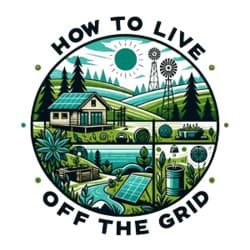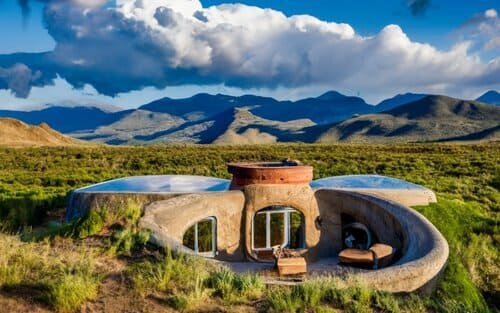Off Grid Homes
Disconnect from the grid and reconnect with nature in off grid homes.Finding Your Perfect Off-Grid Home
With so many awesome options, choosing the right off grid home to suit your needs and dreams can be both fun and overwhelming! Whether you crave a cozy log cabin surrounded by nature, an earthy eco-haven, or a trendy recycled shipping container pad, there’s an ideal off grid home out there for everyone.
An Off Grid Home for everyone
Seeking a back-to-basics lifestyle aligned with nature? Yurts, cabins, or earthships built sustainably from natural materials may be your perfect match. Sleep soundly under a dome skylight, wake to mountain views and birdsong, and grow your own food in these peaceful off grid homes immersed in the elements.
Prefer creature comforts with modern or industrial edge? Customizable shipping container homes let you stack, slide, and design sleek, eco-friendly spaces. Or deck out an RV with smart amenities for a luxury home on wheels! Tiny houses also pack enormous function into ingenious compact footprints without skimping on style.
Of course one of the best aspects of off grid homes is taking your abode on adventures! RVs, school buses, vans, cabins, and tiny houses on trailers all enable following jobs, weather, or whim across the open road. Experience epic national park views one month, then vibrant city lights the next, all while living mortgage and utility free.
At the end of the day, there are awesome options for every taste and dream. Talk with fellow off grid home enthusiasts and builders to discover the sustainable dwellings that most inspire you. Then start crafting your own peaceful paradise!
Cabins
Nothing beats the cozy charm of a rustic log cabin off grid home! Surrounded by nature’s beauty, cabins are handcrafted havens for unwinding and unplugging from the stresses of modern life. Sip coffee fireside, do some stargazing from the porch, and embrace the simple pleasures.
Tiny Homes
Tiny houses are so ingenious for off-grid living! Compact yet fully equipped with smart layouts, these eco-friendly tiny homes on wheels are revolutionizing adventure. Tow your unique oasis anywhere you roam!
RV’ s – Campers
Can you imagine a cooler off grid home than an RV decked out for adventure? Wake up to epic views, hit the road chasing sunsets – with solar amenities, you’ve got your dream home on wheels!

Yurts
Yurts totally transport you back to simpler times in cultural off grid homes. Sleep soundly under the dome, make coffee on the woodstove, relax and reconnect with basics in these cozy circular dwellings.
Shipping Containers
Ever dreamed of a sleek, modern off grid home? Make it happen with upcycled shipping containers! Customize your own oasis with eco-friendly edge using these durable, stackable boxes.
Earthships
For off grid homes in true harmony with nature, you can’t beat earthships built sustainably from recycled materials and earth. Self-sufficient and solar-powered, they align perfectly with sun and rain.
Picking the Right Stuff for Your Off Grid Home
Making an off-grid home fully self-reliant takes some homework on key systems:
- Power – Solar panels, wind turbines, generators – lots of ways to go for off-grid power. Take a look at your electrical needs and research what green energy sources could work best in your area’s climate.
- Water – Drilling a well or harvesting rainwater are typical solutions. Gravity-fed rainwater setups with big cisterns are popular for good reason.
- Septic – You’ve got options like composting toilets, old-school outhouses, septic tanks with leach fields, and more for dealing with waste off-grid.
- Heating and Cooling – Wood stoves, propane heaters, and passive solar design are go-tos for heating. Passive cooling, some AC running off your power system, and just using fans are possibilities for keeping cool.
- Food – Consider gardening, livestock, a greenhouse, food storage and preservation when planning how to feed yourself off-grid.
Make sure to dig into other stuff like waste and water heating, appliances, storage and more based on what you want for your off-grid homestead. Ask experts about ideal sustainable systems to make your dreams a reality!
Key Factors in Choosing an Off Grid Home
There are several important considerations when selecting the right off grid home:
- Budget – Initial build costs and ongoing maintenance expenses. Some off grid homes like RVs or yurts are budget-friendly, while earthships or container homes can be pricey.
- DIY Skills – Building and maintaining an off grid home requires hands-on skills. Evaluate if you can DIY or need to hire help. Cabins and tiny houses are beginner-friendly.
- Climate and Location – Consider your climate zone, temperatures, weather risks, and location resources. Some off grid homes like yurts work best in certain environments.
- Lifestyle – Match the home to your lifestyle vision. For instance, RVs for frequent moves or cabins for settled homesteads.
- Energy Needs – Size your solar, wind, or other off grid power systems based on expected electrical usage. Appliances, HVAC require more capacity.
- Water and Septic – Have a plan for water supply and sewage handling. Wells, rain harvesting, composting toilets are common off grid solutions.
Carefully weighing factors like these helps ensure your DIY off grid lifestyle aligns with your needs and resources.
What are the Pros of Living Off Grid?
There are many potential benefits of off the grid living:
- Sustainability – Live lightly without relying on public utilities. Use renewable energy and environmentally friendly systems.
- Freedom & Self-sufficiency – Detached from bills, government regulations, societal pressures. Dictate your own lifestyle.
- Cost savings – No more utility bills. Reduce expenses through homesteading, gardening, DIY living.
- Healthy lifestyle – Hard work, fresh air, nutrition from home-grown food, active days.
- Peace & quiet – Escape noise, traffic, crowds. Immerse in nature from your secluded off grid home.
- Purpose – Find meaning through productive activities like gardening, home maintenance, livestock care.
- Preparedness – Develop valuable survival skills. Be equipped to handle emergencies off grid.
The rewards of adopting an off grid, homesteading lifestyle are numerous for those able to meet the challenges. The pros above should be weighed against the commitment required.
What are the biggest challenges of off grid living?
Self-reliance for all home repairs and emergencies, Lots of physical labor like hauling water, chopping firewood, Obtaining adequate nutrition without modern grocery access, Dealing with isolation and lack of creature comforts
How much land do you need for an off grid home?
No set amount, but more land provides resources and buffer space, 1-5 acres minimum is recommended for crops/livestock, Adequate solar access is key for siting off grid homes
Can you get a mortgage for an off grid home?
Traditional mortgages usually require being grid-connected, Alternative lenders more flexible – seek ones familiar with off grid homes, May need larger down payment than conventional home
Do you need to pay property taxes on off grid homes?
In most areas, yes – being off grid does not exempt property taxes, Tax rates based on land value, not home itself, Some rural areas have lower property tax rates
Can you get insurance for an off-grid home?
Yes, but it may be more limited than standard home insurance, Communicate off-grid status to find providers comfortable with it, Higher premiums and exclusions for certain risks
How do you set up communications living off grid?
Satellite internet, shortwave radio, and cell signal boosters are common, Minimal electronics to reduce power draw, Physical mail service via PO box or rural delivery





